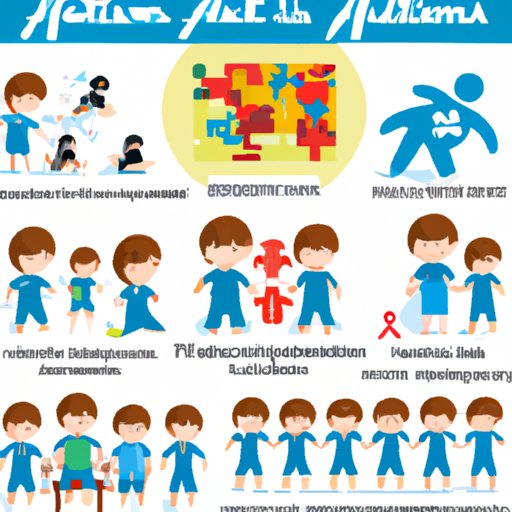
Introduction
Autism Spectrum Disorder (ASD) is a neurodevelopmental disorder that affects communication, social interaction, behavior, and sensory processing. It is a lifelong condition that affects people of all ages, ethnicities, and cultures. Understanding the signs and symptoms of autism is crucial for early detection, effective management, and access to appropriate support and resources. In this article, we will explore how to know if you have autism, the signs and symptoms to look out for, early detection strategies, testing and diagnosis, personal experiences, co-occurring conditions, and seeking help and support.
Signs and Symptoms of Autism
Autism affects individuals differently, but some common signs and symptoms include:
- Difficulties with social interaction, communication, and nonverbal behaviors such as eye contact, body language, and facial expressions
- Repetitive behaviors or routines, such as hand flapping, spinning, or lining up objects
- Difficulties in learning, processing information, or problem-solving
- Sensory processing challenges, such as sensitivity or indifference to sound, touch, taste, sight, or smell
- Intense interest or obsession with a specific topic or activity, such as trains, animals, or numbers
The signs and symptoms of autism vary depending on the individual, their age, and the severity of their condition. Some individuals may exhibit mild symptoms, while others may have more severe challenges that impact their daily life and relationships.
Specific Signs and Symptoms Across Different Age Ranges
The signs and symptoms of autism may vary across different age ranges. For example:
- Infants: Lack of eye contact, delayed social smiles, minimal vocalizations
- Toddlers: Delayed speech or language skills, lack of interest in playing with peers, repetitive behaviors or routines
- Children: Difficulty understanding social rules or norms, difficulties with empathy or perspective-taking, intense focus or interest in specific activities or topics
- Teens and Adults: Difficulties with social relationships or dating, difficulty adapting to work or college settings, limited interest in hobbies or social activities
It is essential to recognize the signs and symptoms of autism as early as possible to promote early intervention and effective management.
Early Warning Signs
Early detection is critical for effective management and support of individuals with autism. Some early warning signs include:
- No babbling or pointing by 12 months
- No single words by 16 months
- No two-word phrases by 24 months
- Loss of language or social skills at any age
- Repetitive behaviors, such as spinning or rocking
- Lack of interest in playing with peers
The American Academy of Pediatrics recommends that all children receive routine developmental screenings at 9, 18, and 30 months of age, and additional screenings as needed.
Early intervention programs, such as speech therapy, occupational therapy, or behavior therapy, can help children with autism develop social and communication skills that promote success in school, work, and life.
Diagnosis and Testing
The diagnosis of autism is based on a comprehensive assessment of the individual’s behavior, interests, and communication skills. The testing procedures and diagnostic tools may vary depending on the individual’s age, symptoms, and health history.
Some of the commonly used diagnostic tools and tests for autism include:
- Autism Diagnostic Observation Schedule (ADOS)
- Autism Diagnostic Interview-Revised (ADI-R)
- Childhood Autism Rating Scale (CARS)
- Social Communication Questionnaire (SCQ)
It is important to seek out a qualified healthcare provider or specialist, such as a developmental pediatrician, child psychiatrist, or licensed psychologist, for a proper diagnosis. The diagnostic process may include observation of the individual’s behavior, interviews with the individual and their family, and review of medical and developmental history.
It is also important to note that there is no single medical test for autism. Diagnosis is made using clinical judgment based on diagnostic criteria outlined in the Diagnostic and Statistical Manual of Mental Disorders (DSM-5).
Personal Experiences
Autism affects millions of individuals and their families across the world, and each person’s experience with autism is unique. Some individuals with autism may thrive in certain settings or careers, while others may face significant challenges that impact their daily life and well-being.
There are many personal narratives and stories from individuals with autism and their families available online, in books, and in documentaries that provide insight into the diverse range of perspectives and experiences associated with autism.
Listening to and learning from these stories can help increase empathy and understanding for individuals with autism and their families, and promote a more inclusive society.
Co-Occurring Conditions
Autism is often associated with co-occurring conditions, such as attention deficit hyperactivity disorder (ADHD), anxiety, depression, or intellectual disability. These conditions may amplify or complicate the symptoms of autism, and require different treatment approaches.
It is important to recognize the signs and symptoms of co-occurring conditions and seek out appropriate treatment and support. Treatment may include medication, behavioral therapy, or counseling.
Seeking Help and Support
Individuals with autism and their families may feel overwhelmed by the challenges associated with autism, but it is important to seek out help and support in the community and from healthcare providers.
There are many resources and services available for individuals with autism and their families, including:
- Behavioral, speech, and occupational therapy
- Educational interventions and accommodations
- Social skills training and support groups
- Assistive technologies and devices
- Access to disability and health insurance
It is also important to advocate for the rights and inclusion of individuals with autism in the community and society at large.
Conclusion
Autism Spectrum Disorder (ASD) is a lifelong condition that affects communication, social interaction, behavior, and sensory processing. Understanding the signs and symptoms of autism, early detection and intervention, testing and diagnosis, personal experiences, co-occurring conditions, and seeking help and support can empower individuals with autism and their families to live fulfilling lives.
By promoting autism awareness, education, and inclusion, we can build a more compassionate and inclusive society that values the strengths and contributions of all individuals, regardless of their differences.





